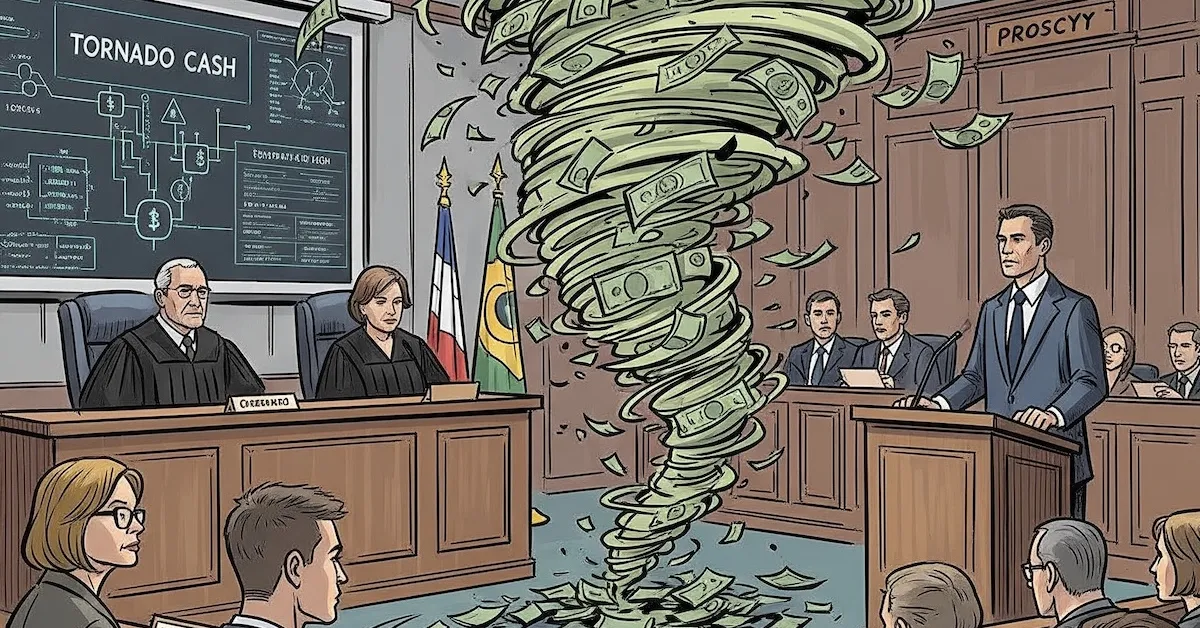Crypto Dev Held Accountable: Tornado Cash Trial Delivers Shocking Guilty Verdict

The high-stakes Tornado Cash trial, concluding recently in the Southern District of New York (SDNY), has significant implications for developers of noncustodial Bitcoin and crypto technology, as well as privacy-preserving software. Amanda Tuminelli, executive director and chief legal officer for the DeFi Education Fund, highlighted the core issues, including the three charges against Tornado Cash co-founder Roman Storm. Her expertise focused on 18 U.S. Code § 1960, the federal law prohibiting unlicensed money transmitting businesses, and she argued that Storm had not violated this statute through the creation and operation of Tornado Cash, an Ethereum-based crypto mixing service.
The trial's conclusion saw Roman Storm found guilty on the second count of his indictment: conspiracy to operate an unlicensed money transmitting business. The jury, after three and a half days of deliberation, did not reach a unanimous verdict on the other two counts, conspiracy to commit money laundering and conspiracy to violate sanctions. This guilty verdict on the money transmission charge means Storm now faces a potential prison sentence of up to five years.
Following the verdict, the prosecution motioned to remand Storm into custody, asserting he was a flight risk. However, Judge Failla rejected this motion. The defense, led by Ms. Klein, successfully argued against it, citing Storm's ties to the U.S. including a $2 million bail bond on his Washington state home, partial custody of his daughter, his girlfriend's U.S. residency, his parents' green card status, and the U.S.-based support from the crypto community for his appeal. Judge Failla noted the 'stability of the verdict is still in play' and that Storm's 'incentives have shifted tremendously,' before denying the remand request.
U.S. Attorney for the SDNY, Jay Clayton, issued a statement shortly after the verdict, claiming Roman Storm and Tornado Cash facilitated North Korean hackers and other criminals in moving and hiding over $1 billion of illicit funds. Clayton emphasized that the promise of stablecoins and digital assets should not excuse criminality, and his office is committed to holding accountable those who exploit emerging technologies for crime. Notably, Clayton did not acknowledge a prior memo from U.S. Deputy Attorney General Todd Blanche, which stated the Department of Justice would cease targeting virtual currency mixing services for the actions of their end users, nor did he mention that the majority of funds processed by Tornado Cash users were not proven to be illicit.
Tuminelli's earlier discussions also covered the CLARITY Act and the Blockchain Regulatory Certainty Act (BRCA). These proposed bills aim to protect developers of 'non-controlling' (noncustodial) crypto technology, stipulating that they do not require a money transmitting license and should not be subject to existing money transmission laws. She also expressed concern that the Department of Justice's shift from 2019 FinCEN guidance threatens innovation in the crypto space and could lead to further prosecutions of developers like Storm, despite Blanche's memo. The DeFi Education Fund has actively engaged, submitting amicus briefs for both the Tornado Cash and Samourai Wallet cases, though the former was rejected by the court.
You may also like...
Haaland's UCL Rampage: Brace, Record, and X-Rated Fury Rocks European Football!

Manchester City were held to a frustrating 2-2 draw against Monaco in the Champions League, despite Erling Haaland's two...
Manchester United's Managerial Maze: Amorim on the Brink, Solskjaer's Ghost Looms

Ruben Amorim faces unprecedented pressure at Manchester United as inconsistent results and a low Premier League standing...
Real-Life Couple Justin Long & Kate Bosworth Unleash 'Coyotes' Horror Comedy, Securing UK Deal

Real-life partners Justin Long and Kate Bosworth star in the new horror comedy and survival thriller “Coyotes,” a film t...
Kenyan Star Bahati Ignites Firestorm with Provocative New 'Seti' Track!

Bahati has ended his musical hiatus with the controversial new song "Seti," featuring explicit content that deviates fro...
Global K-Pop Domination Ignored by Grammys? A Critical Look

Korean pop music has achieved global megaforce status, dominating charts and captivating millions of fans worldwide. Des...
One Direction Reunites! Global Pop Idols Confirm Massive New Project

One Direction stars Louis Tomlinson and Zayn Malik are reportedly reuniting for a Netflix road trip documentary, set to ...
Royal Arrival: Victor & Henrietta Thompson Welcome Baby Princess Zivah!

Gospel singer Victor Thompson and his wife, Henrietta, have joyfully welcomed their baby girl, Zivah Ufuoma Tamunopakiri...
Viral Sensation: M&S 'Cuddle' Jumper Takes Autumn by Storm at Just £26

Discover the M&S Textured Crew Neck Jumper, a viral sensation perfect for colder days. Praised for its luxurious feel, v...